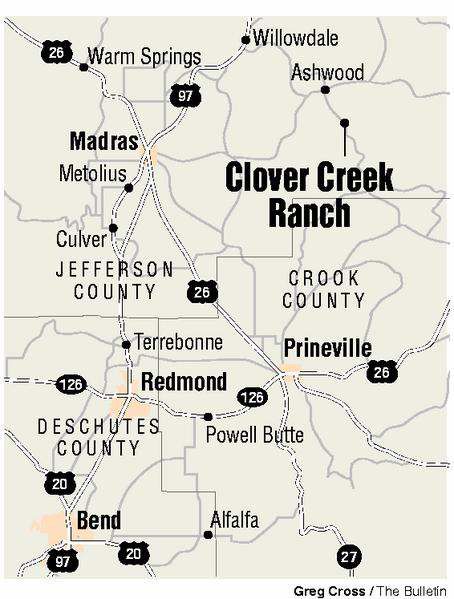High court backs state on Jefferson hunting ranch
Published 4:00 am Friday, November 10, 2006

- High court backs state on Jefferson hunting ranch
SALEM – An Oregon Supreme Court ruling Thursday may be the beginning of the end for a Jefferson County game ranch where hunters can pay to kill exotic animals like buffalo, fallow deer, ibex and boar.
State wildlife officials have long sought to shut down the sprawling 2,200-acre Clover Creek Ranch near Ashwood because of the potential that the animals there might escape and interbreed, choke out native species in the area or spread disease.
Trending
”In our world, fish and wildlife management has to be concerned about the bigger picture and not one individual,” said Marla Rae, a lobbyist and the chairwoman of the state Fish and Wildlife Commission. She grew up in Gateway, north of Madras.
Thursday’s ruling validates the state’s ability to regulate so-called ”canned hunting” of exotic species in enclosed places and agrees with a previous appeals court ruling.
Both the Oregon Supreme Court and Oregon Court of Appeals reversed a Jefferson County Circuit Court decision, in which Judge Gary S. Thompson dismissed 50 of 51 wildlife violations levied in 2001 against Clover Creek owner Clark Couch.
Couch had argued that the animals at his ranch are domesticated and the equivalent of livestock – not wildlife.
The court disagreed, saying the definition of wildlife is up to the Legislature, and sided with the Oregon Department of Fish and Wildlife, which asserts that exotic animals that are imported or bred in captivity still qualify as wild animals that fall under the control of the state.
The case now goes back to Jefferson County, which will reconsider the hunting violations. No court date has been set.
Trending
Thursday’s unanimous ruling was written by Chief Justice Paul DeMuniz, who said the term wildlife can refer to more than ”animals living untamed in a state of nature.”
The decision may ultimately put the Clover Creek Ranch out of business, but it will not immediately end the long-running and expensive feud between the state and its owner.
Couch said in a telephone interview Thursday that he was disappointed but not surprised with the decision.
He believes the state, in concert with anti-hunting groups, has a vendetta against him. A federal appeal or a class action lawsuit are possibilities, he said.
Couch said he believes the state simply can’t seize his private property without compensation, and he estimates that the 300 to 400 animals on his ranch – animals he has bought and paid for – have a value of close to $2 million.
In addition, anybody else in Oregon who owns an exotic or imported animal – such as a turtle, zebra or even a buffalo – will also lose their ownership under the broadened definition of wildlife, he argued.
”It’s a takings issue. If they take full ownership of private property, they have to pay for it.”
State Wildlife Division Manager Ron Anglin said Thursday he is unaware of any precedent in which the state has paid a person for their exotic animals.
Attorneys are evaluating the court ruling before deciding the agency’s next steps, but Anglin affirmed that the state intends to remove the animals at Couch’s Central Oregon operation as soon as possible.
He is not aware of any animals escaping from Couch’s facility, but said the state can’t take chances.
He cited the example of another invasive animal, bullfrogs, which have taken over habitat in Oregon and driven native frogs toward extinction.
The Clover Creek Ranch is the only safari-type hunting business in Oregon, Anglin said.
The state already bans the ”canned hunting” of native game species.
Thursday’s ruling was applauded by the Humane Society of the United States, which submitted a brief in support of the state’s position.
”Responsible hunters and wildlife managers know there’s no sport in shooting exotic animals trapped behind fences,” said Jonathan R. Lovvorn, the Humane Society’s vice president for animal protection litigation.
”We commend the Wildlife Commission’s decision to put an end to cruel, drive-thru killing in Oregon,” he stated in the news release.
The state commission adopted the rules banning exotic animal canned hunts in 1999. Even then, Couch, whose operation already existed, was embroiled in legal tussles with the state over the breeding of sheep and deer.
The charges against Couch in Jefferson County included 22 counts of unlawful sale of wildlife, 25 counts of aiding and abetting the unlawful hunting of wildlife, and three counts of unlawful possession of wildlife.
In each of those counts, the state alleged that he possessed, sold or hunted fallow deer, axis deer, or sika deer – none of them indigenous species.
The 51st charge involved possession of elk.
The Clover Creek Ranch, surrounded by 16 miles of fence, has been doing business in the rugged backcountry of Jefferson County for a half century.








